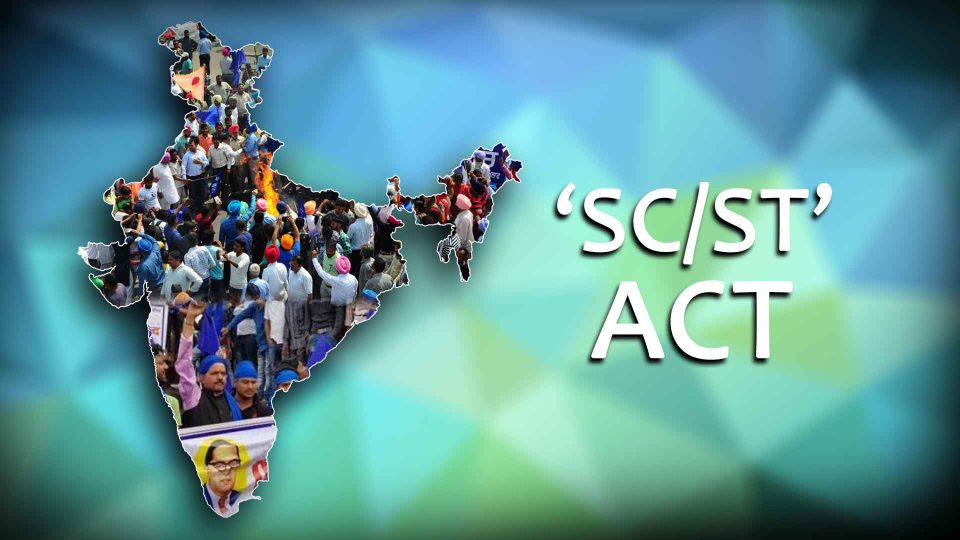The ‘Bharat Bandh’ called by various Dalit organizations to protest the amendments related to arrests under SC/ST Act turned violent engulfing at least eight states.
The series of protest against Dalit Atrocities have rocked many states of India. Two months ago, the Dalit protestors took it to the street to protest against the Bhima-Koregaon violence after Bharipa chief Prakash Ambedkar called for a ‘Maharashtra Bandh’. Just two weeks ago, a massive gathering at the Azad Maidan in Mumbai protested against the government demanding the arrest of Sambhaji Bhide-one of the accused in Bhima-Koregaon violence. This time the Supreme Court order introducing amendments in the SC/ST (Prevention of Atrocities) act triggered the bloodied protests across the country on Monday.
The ‘Bharat Bandh’ called by various Dalit organizations to protest the amendments related to arrests under SC/ST Act turned violent engulfing at least eight states. According to the reports, four people lost their lives during the protests while several others have been injured during these protests. Gujarat, Punjab, Uttar Pradesh, Bihar and Jharkhand are among the states which witnessed the violent protests causing damage to life and property.

But what exactly is the SC/ ST act and why is it so controversial? Read on to know:
Background:
A significant part of our history consists of heinous crimes committed against the Dalits who were considered the lower castes as per the caste system prevalent in India. The Dalit community was subjected to inhuman treatment, humiliation and banishment. This also gave rise to ‘untouchability’. In independent India, Article 17 was added to the constitution to abolish and forbid such archaic practices. The objective of the Article 17 was to remove humiliation and harassments meted out to the Dalits. It also aims at giving them equality and ensure their fundamental and socio-economic, political, and cultural rights.
Initially, Untouchability (Offences) Act 1955 was brought into force. However, it had many loopholes due to which it couldn’t help the Dalit community. The Act was revamped in 1976 as the Protection of Civil Rights Act. However, despite adding various measures, the socio-economic conditions of the SCs and STs still remained one of the vulnerable communities.
These acts along with the Indian Penal Code weren’t enough to address the issue of indignities and harassment meted to the Dalit community. Thus, the Parliament passed ‘Scheduled Caste and Scheduled Tribe (Prevention of Atrocities) Act’, 1989 & Rules, 1995.

SC/ST (Prevention of Atrocities) Act:
The act was introduced with the aim of social inclusion of the Dalit community. The roots of such atrocities were found to be rooted in the caste system. Thus, stringent laws were brought in to prevent/punish any such acts of atrocities on Scheduled Caste and Scheduled Tribes. The SC/ST (Prevention of Atrocities) Act was enacted on 9 September 1989. The Section 23(1) of the Act authorises the Central Government to frame rules for carrying out the purpose of the Act. Drawing power from this section, the SC /ST (Prevention of Atrocities) Rules of 1995 were framed. The rules for the Act were notified on 31 March 1995.
Though the act was introduced to ensure the dignity of life to the Dalit community, how much it has succeeded to achieve its aim, is still debated. The crime committed against the members of SC/ST community are considered as cognizable offences under the law and are punishable with up to minimum 6 months of sentence or maximum of 5 years’ imprisonment with fine.
Under the SC/ST act, it is mandatory for all the states to set up a special court for speedy trials of the cases registered.
SC/ST (Prevention of Atrocities) Act, Amendments 2015:
In 2015, the government proposed some changes to the parent law which were passed by the parliament. It added new offences such as Compelling the member of SC/ST community to do manual scavenging or to carry dispose of animal or human carcasses, hurling abuses at the member of the community using his caste, disrespecting any deceased SCs/STs person held in high esteem or attempting to promote feelings of ill-will against SCs/STs, etc.
What has stoked the controversy now?
On March 20, 2018, the Supreme Court while hearing three issues related to misuse of SC/ST Act against government servants ordered that the arrest of a public servant can only be made after approval of the appointing authority. Preventing the automatic arrest provision under the law, the Apex Court ruled that a non-public servant can be arrested after approval by the Senior Superintendent of Police (SSP). Further, it said that before filing an FIR under the act, a brief inquiry will have to be conducted. The court also asked the investigating officers to make sure before handed whether the case sure that the charges fall under the Act or have a political and/or personal agenda behind it.

While the purpose of the amendment is to protect the honest public servants from being a victim of blackmailing and curb the exploitation of the act, Dalit organizations fear that dilution of the provisions may lead to increase in violence against the SC/ST community.
As an independent media platform, we do not take advertisements from governments and corporate houses. It is you, our readers, who have supported us on our journey to do honest and unbiased journalism. Please contribute, so that we can continue to do the same in future.

